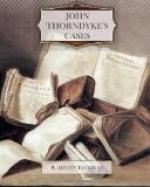At the friendly reproof the young surgeon pulled himself together, and, with open notebook, commenced his investigation, while I, at Thorndyke’s request, occupied myself in making a plan of the room, with a description of its contents and their arrangements. But this occupation did not prevent me from keeping an eye on Thorndyke’s movements, and presently I suspended my labours to watch him as, with his pocket-knife, he scraped together some objects that he had found on the pillow.
“What do you make of this?” he asked, as I stepped over to his side. He pointed with the blade to a tiny heap of what looked like silver sand, and, as I looked more closely, I saw that similar particles were sprinkled on other parts of the pillow.
“Silver sand!” I exclaimed. “I don’t understand at all how it can have got there. Do you?”
Thorndyke shook his head. “We will consider the explanation later,” was his reply. He had produced from his pocket a small metal box which he always carried, and which contained such requisites as cover-slips, capillary tubes, moulding wax, and other “diagnostic materials.” He now took from it a seed-envelope, into which he neatly shovelled the little pinch of sand with his knife. He had closed the envelope, and was writing a pencilled description on the outside, when we were startled by a cry from Hart.
“Good God, sir! Look at this! It was done by a woman!”
He had drawn back the bedclothes, and was staring aghast at the dead girl’s left hand. It held a thin tress of long, red hair.
Thorndyke hastily pocketed his specimen, and, stepping round the little bedside table, bent over the hand with knitted brows. It was closed, though not tightly clenched, and when an attempt was made gently to separate the fingers, they were found to be as rigid as the fingers of a wooden hand. Thorndyke stooped yet more closely, and, taking out his lens, scrutinized the wisp of hair throughout its entire length.
“There is more here than meets the eye at the first glance,” he remarked. “What say you, Hart?” He held out his lens to his quondam pupil, who was about to take it from him when the door opened, and three men entered. One was a police-inspector, the second appeared to be a plain-clothes officer, while the third was evidently the divisional surgeon.
“Friends of yours, Hart?” inquired the latter, regarding us with some disfavour.
Thorndyke gave a brief explanation of our presence to which the newcomer rejoined:
“Well, sir, your locus standi here is a matter for the inspector. My assistant was not authorized to call in outsiders. You needn’t wait, Hart.”
With this he proceeded to his inspection, while Thorndyke withdrew the pocket-thermometer that he had slipped under the body, and took the reading.
The inspector, however, was not disposed to exercise the prerogative at which the surgeon had hinted; for an expert has his uses.




